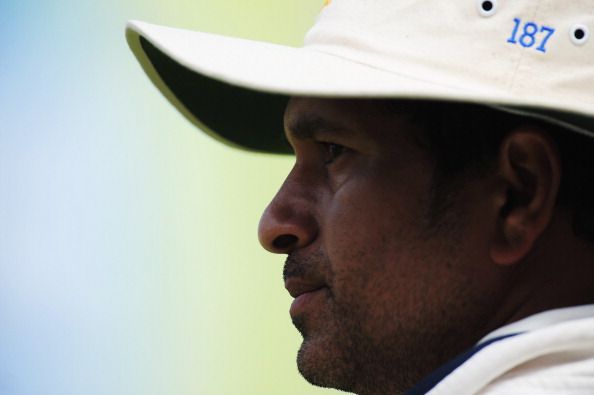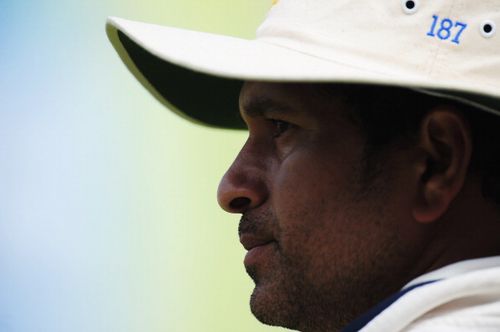
Multan declaration did not make sense, writes Sachin Tendulkar in his autobiography

Into Day 2 of the first of the 3-match Test series against Pakistan in 2004, at Multan, stand-in captain Rahul Dravid opted to declare the Indian first innings with the scoreboard reading 675-5 in 161.5 overs; it left Sachin Tendulkar stranded at 194 not out, 6 runs short of a double century.
While there were rumours going around at that point of time that Tendulkar was extremely disappointed and furious at the management’s decision, which cut his innings painfully short while approaching a landmark, the 41-year-old, writing in his autobiography ‘Playing it My Way’ has made no bones about his dissatisfaction: "I assured Rahul that the incident would have no bearing on my involvement on the field, but off the field, I would prefer to be left alone for a while to come to terms with what had happened."
Shedding light into the events in build-up to the declaration, he writes, “At tea-time, I asked stand-in skipper Rahul Dravid, who was in charge because Sourav was out with a back injury, and coach John Wright what the plan was. I was informed, we were looking to give Pakistan an hour to bat, so would put them in with 15 overs left on the second day. It was perfectly sensible and I went about my business after tea with this plan in mind.
"But then, a little more than half an hour into the post-tea session, Ramesh Powar, who was substituting in the game came on the field and asked me to accelerate. I even joked with him, saying I was aware that we needed quick runs but with the field totally spread out, there was only so much we could do.
"A little later, when I was on 194, he came out again and said I should try and get my double hundred in that over itself because Rahul had decided to declare. I was startled to say the least, because in my mind I still had 12 balls in which to score the remaining six runs before 15 overs were left for the day.
"As it happened, I did not get to play a single ball in that over with Yuvraj on strike against Imran Farhat. He blocked the first two balls before picking up two runs off the third ball. He once again blocked the fourth ball and was out to the fifth ball.
"Then just as Parthiv Patel, the next batsman started to come out, I saw Rahul gesturing us to go back to the pavilion. He had declared the innings with me stranded on 194 and with 16 overs left for the day -- one more than we had agreed.”
I was fuming but didn’t create a scene
Tendulkar, expressing his shock, has said that he refrained from creating a scene about it, as it is not in him to do so.
"I was shocked as it did not make any sense. It was Day 2 of the Test match and not Day 4, as it had been in Sydney, a month earlier."
"Disappointed and upset, I made my way back to the dressing room and could sense that the whole team was surprised at the decision (Rahul Dravid declaring with me stranded at 194). Some of my team-mates perhaps expected me to throw my gear about in the dressing room in disgust and create a scene. However, such things are not in me and I decided not to say a word to anyone about the incident.
"I calmly put my batting gear away and asked John Wright for a little time before I went out to field because I was feeling a little tight after batting for so long. Inside, I was fuming.”
No party to declaration – John Wright
The then head coach John Wright was the first to walk towards him and apologise for the incident, before adding he had no say in it.
He writes, “Just as I was washing my face in the bathroom, John walked up to me and apologized. He was sorry about what had happened and said he had not been party to the decision. I was surprised and said to him that as coach he was one of the decision-makers and there was no reason for him to be sorry if he believed in what had been done.”
Ganguly’s apology
Then came Ganguly with his excuse.
Tendulkar writes, "Soon after my exchange with John, Sourav came to me and said he was very sorry at what had happened and that it wasn't his decision to declare. This was a little surprising, as the skipper, was part of the tea-time discussion and was also present in the dressing room at the time of declaration."
"I said to him (Sourav) that there is no point going over it anymore."
Manjrekar’s views were not welcome
Former Indian cricketer Sanjay Manjrekar, who was commentating during the match, approached Tendulkar appreciating the positive intent of the Indian management. His views were not exactly welcome.
He writes, “I explained to him that he was not aware of what had transpired in the dressing room and arrived at his judgement without knowing the real facts of the matter. I made it clear that I didn't appreciate his opinion, which I thought was a deliberate attempt to be different."
"Rahul said that the call was taken with the interests of the team in mind. It was important to demonstrate that we meant business and were keen to win. I wasn't convinced. First, I said to him that I was batting for the team as well. The 194 was meant to help the team and it was my individual contribution to the team's cause."
Rahul Dravid’s view
Finally walked in Dravid, explaining why he did so. Tendulkar wasn’t convinced and still maintains that the decision made no sense.
"Rahul said that the call was taken with the interests of the team in mind. It was important to demonstrate that we meant business and were keen to win. I wasn't convinced. First, I said to him that I was batting for the team as well. The 194 was meant to help the team and it was my individual contribution to the team's cause.
Recalling the Sydney Test match, held not too long before, Tendulkar told Dravid: "When we had both been batting on the fourth evening and Sourav had sent out two or three messages asking when we should declare and Rahul had carried on batting. The two situations were comparable and, if anything, the Sydney declaration was far more significant and may have cost a Test match and series victory. If Rahul was so keen show intent in Multan, he should have done the same in Sydney."
Glad that friendship remained unaffected
Tendulkar, however, also makes it clear that the incident didn’t have a bearing in their relationship in days that followed. He writes, "Despite this incident, I am glad to say Rahul and I remained good friends and even on the field, our camaraderie remained intact until the end of our careers. We continued to have some good partnerships and neither our cricket nor our friendship was affected."
India, eventually, won the match and the series, as well. The master’s frustrations, though, are clearly evident from his words, and the scar is likely to be there forever, going by the tone of this chapter.